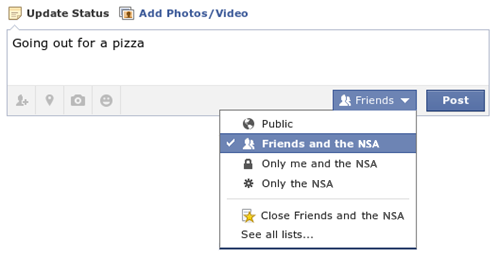The US government may as well have intelligence agents peeking over our shoulders at any given moment – or that’s what some people seem to believe, especially after the PRISM revelations last month. Given that nine of the internet’s biggest companies were involved with giving data to the National Security Agency, there’s barely an internet user out there who hasn’t unwittingly compromised their privacy. Microsoft, Yahoo!, Google, Facebook, Skype, AOL, and Apple are involved, and that includes all of their subsidiary services, like Youtube, Flickr, and Instagram, to name a few. Leaked documents laid out plans to include Dropbox in the information roundup, as if it wasn’t extensive enough. And of course, we’ve all seen that Obama is Checking Your Email.

So if we can’t even turn to the our smartphones without risking the privacy of our metadata, where can we turn to keep our information ours? Services are popping up left and right to answer that very question – and some of them have seen PRISM kickstart early success.
Search Engines
Whenever you’re logged in to a Google product – Google+, Gmail, or Youtube, for example – the company keeps a record of everything you search. When you click through to websites via your searches, those websites are given information about what you searched, when, and from where. And because Google keeps a record of what you’re searching and where you’re going from those searches, that data can be legally requested by governments.
Duckduckgo is marketing itself as Google’s best anonymous alternative, and experienced huge growth in the week after the PRISM revelation. It’s ad-free, has a clean user interface, and it works with its users to make developments. But it’s precisely that lack of user tracking that makes it a little less accurate than Google, so it takes a bit more scrolling to find what you’re looking for. It’s also slower than its mainstream peers, but given its rapid growth, it’s likely that will improve with time.
Browsers
As an online community, we’ve bounced from Internet Explorer to Mozilla Firefox to Google Chrome – and it may be time to jump back a step. Mozilla has stood up for civil liberties in the past, and what’s more, it can be used in combination with Tor, a system that bounces your information across the world to prevent it being tracked. It does set back your speed significantly compared with Chrome, though, so if you can’t deal with slow browsing, try using this creative Firefox plug-in instead to help you avoid PRISM-related companies.
Gmail, Hotmail and Yahoo! Mail are all out of the question, but is there even anything else out there? Unless you’re hosting email yourself, not really. Hushmail was glorified as an alternative until 2007, when it became clear the service had security compromises. While you can encrypt the content of your emails on web servers, you have no control over your metadata. The best alternative? The poor old facsimile.
Social Networking
Given that the entire purpose of social networking is to share, it never was going to be entirely secure. Mark Zuckerberg somehow lulled most of us into a false sense of trust, a bubble that PRISM was quick to break. That’s even before the recent news that a serious bug exposed 6 million users, and that literally anybody can hack certain accounts. For a truly private network, Diaspora and Movim offer self-hosted networks, but private social networking defeats the point for many of us. Social networking is like having a conversation in public – if you don’t want a sensitive discussion to be overheard, go elsewhere.
Phones
If you use a smartphone, the only way out is Blackberry. Both Apple iPhone and Google Android systems regularly transmit information about your location back to their parent companies, including information about Wi-fi networks around you. But Blackberry’s encryption is so tough that some countries have complained about its apparent threat to national security.
Or, stop beating around the bush and tell the US government exactly where you are and what you’re doing, like TED speaker Hasan Elahi, who created a website that tracks him 24/7 purely to spite the FBI. (Yes, the FBI does access it!)
Did You Know?
In June, the Australian government wrote a letter to Google citing its concerns about Google Glass. Google’s response is yet to be received – we’re waiting eagerly.

Comments (0)